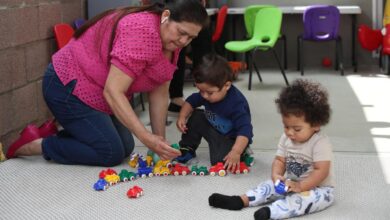
Early childhood is a canvas of boundless creativity. Cultivating and nurturing this creativity from an early age lays the foundation for a lifetime of innovative thinking and expression. Let’s explore how fostering creativity in the early years can shape a child’s development:
The Essence of Early Childhood Creativity
Creativity is not confined to artistic endeavors; it’s a way of thinking and problem-solving. Early childhood creativity encompasses imagination, exploration, and the freedom to express oneself.
Embracing Open-Ended Play
Open-ended play allows children to explore their interests without limitations. Providing open-ended toys like blocks, clay, and dress-up materials sparks imagination and fosters divergent thinking.
Encouraging Artistic Expression
Art provides a platform for children to express emotions, thoughts, and ideas. Providing access to art materials and allowing free art creation nurtures imagination and self-expression.
Stimulating Sensory Exploration
Sensory experiences through diverse textures, scents, tastes, and sounds stimulate creativity. Sensory play engages multiple senses, promoting cognitive development and innovative thinking.
Supporting Imagination and Pretend Play
Encouraging imaginative play, like pretending to be different characters or creating make-believe worlds, enhances creativity and storytelling abilities.
Parental Role in Fostering Creativity
Parents play a pivotal role in nurturing creativity. Providing a supportive environment, engaging in creative activities together, and valuing their child’s ideas encourages creative thinking.
Emphasizing Process Over Product
Focus on the process rather than the end product. Encouraging experimentation and valuing the journey of creation fosters resilience and a willingness to take risks.
Encouraging Curiosity and Problem-Solving
Encourage curiosity and critical thinking by posing open-ended questions and allowing children to explore and find solutions independently.
Embracing Mistakes as Learning Opportunities
Mistakes are part of the creative process. Encourage a positive attitude toward mistakes, highlighting their role in learning and innovation.
Conclusion
Nurturing early childhood creativity sets the stage for a future filled with innovation, resilience, and adaptability. By providing an environment that encourages exploration, experimentation, and self-expression, parents and caregivers can help children unlock their creative potential.










